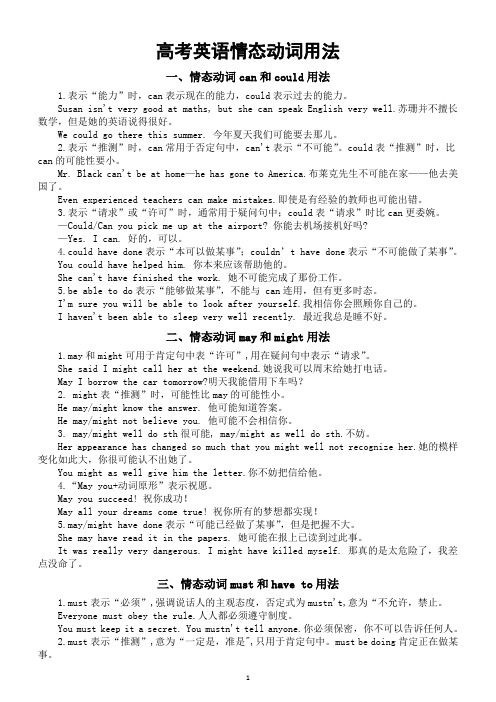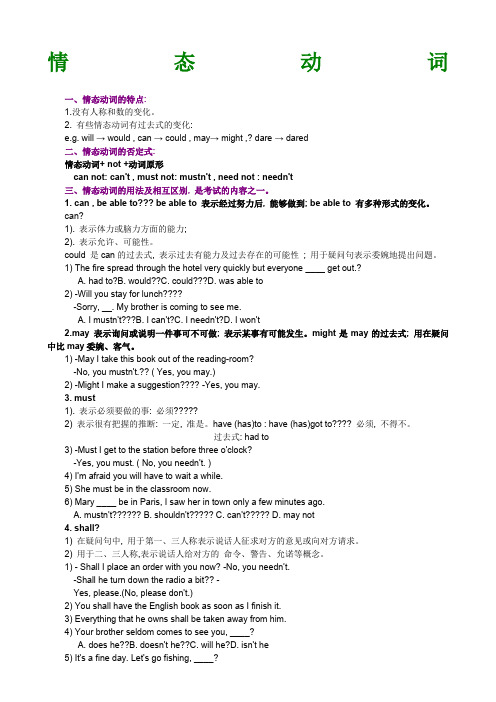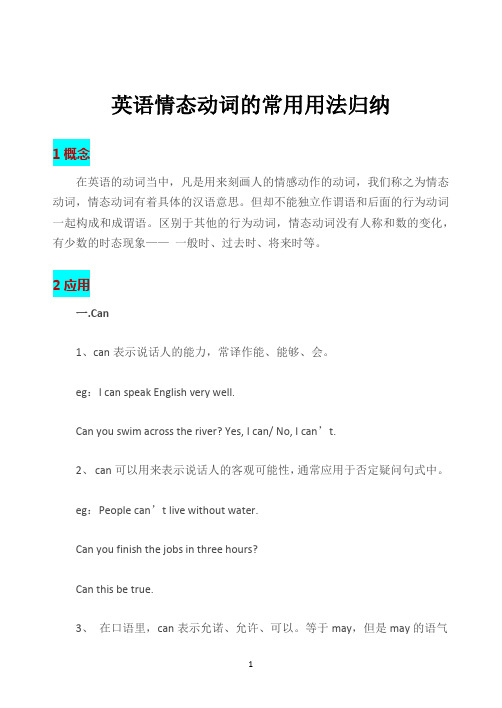高中情态动词用法解析
情态动词(用法)(一)

高中英语语法Modal Verb(情态动词)情态动词表示说话人的某种情感表态:(1)can表示能力,意为“会”“能”例:He can speak English now.他现在能说英语了。
(2)can表示“允许”或“请求允许”,意为“可以”例:can I use your phone?我可以用一下你的电话吗?(3)can表示说话人的猜测,用来表示惊讶,怀疑,不相信等态度,主要用于否定句和疑问句。
例:I believe that she can`t be so careless.(对现在进行推测)我相信她不会如此粗心。
例:What can he be being ?(对现在发生的事进行推测)他会在干什么?例:The ground isn`t wet, it can`t have rained last night.(对过去发生的事进行推测)地面未湿,昨晚上肯定没下雨。
Be able to表示“能力”,如果只表示能力时,两者都可用,但若表示经历一定的挫折打击,终于能够怎么样,过去的能力+特定行为时,则要用 was/were able to(1)现在时,两者皆可能,例:I can/am able to swim 我会游泳。
(2)用于表示过去的能力,两者皆可用。
例:When he was three he could/wasable to swim.当他3岁就会游泳了。
(3)表示将来的能力不能用can, The baby will be able to walk in a few weeks.这个婴儿用了几个星期就会走路了。
(4)他能够而且的确去了,只能用was able to. His mother wasn`t at home, sohe was able to go to see the film. 他的妈妈不在家,因此他就去看电影了。
(5)Be able to 还可以用于完成时态,而can不能。
高中英语情态动词的用法

高中英语情态动词的用法高中英语情态动词的用法一概述情态动词的共性1)情态动词一般直接加动词原形, 除ought + to do sth .在否定句或疑问句中to 可以省略2)情态动词不会因为主语的人称与数的变化而发生变化3)当情态动词表达与说话同时或说话之后的情况,直接加动词原形(do sth/be done) .在简略回答时直接用情态动词(---Can you drive a car? ---- Yes, I can)(1)She said he might come to the farewell party (表达说话之后的情况)(2)She told me that he must be ill, for his face was pale(表达与说话同时情况)4)当情态动词表达说话时已发生的情况,加动词完成式( have pp/have been pp)在简略回答时用情态动词+ have (---- Did he go to the cinema? ---- No, he should have,but he had to finish a report)(1)She may have been there yesterday(2)She should have come to his rescue when he was trapped in the elevator last night(3)He must have been praised at the meeting the other day二情态动词用法1 can1)表示现在或将来的能力,2)表示可能性“可能”(1)在肯定句中指逻辑推理的可能性,不指具体的事情的可能性,即泛指的可能性但在否定句或疑问句中可以表达具体一件事情的可能性 A: Driving carelessly can be dangerous B: Too much stress can drive a person mad C: Everybody can make mistakes in his life D:There being too much snow on a highway can lead to accidents (2)在否定句中表示“不可能”A: He can?t be hungry B: She can?t have been criticized at last week?s meeting C: She can?t possibly be tired(3)在疑问句中表示“可能吗?”A: Can she have been to the scenic spot last Friday?(4)S + can have (been)+ pp表示“可能已发生某事”,一般用在否定句或疑问句,如: Can she have been to the scenic spot last Friday? (5)在肯定句中还可以表示“有时可能” A: Scotland can be very cold in winter B: He is a bad-tempered guy, but he can be quite charming when he wishes C: You can be very annoying总之can表示可能性“可能”时可以用在肯定句、否定句和疑问句中。
高中英语2025届高考情态动词用法归纳

高考英语情态动词用法一、情态动词can和could用法1.表示“能力”时,can表示现在的能力,could表示过去的能力。
Susan isn't very good at maths, but she can speak English very well.苏珊并不擅长数学,但是她的英语说得很好。
We could go there this summer. 今年夏天我们可能要去那儿。
2.表示“推测”时,can常用于否定句中,can't表示“不可能”。
could表“推测”时,比can的可能性要小。
Mr. Black can't be at home—he has gone to America.布莱克先生不可能在家——他去美国了。
Even experienced teachers can make mistakes.即使是有经验的教师也可能出错。
3.表示“请求”或“许可”时,通常用于疑问句中;could表“请求”时比can更委婉。
—Could/Can you pick me up at the airport? 你能去机场接机好吗?—Yes. I can. 好的,可以。
4.could have done表示“本可以做某事”;couldn’t have done表示“不可能做了某事”。
You could have helped him. 你本来应该帮助他的。
She can't have finished the work. 她不可能完成了那份工作。
5.be able to do表示“能够做某事”,不能与 can连用,但有更多时态。
I'm sure you will be able to look after yourself.我相信你会照顾你自己的。
I haven't been able to sleep very well recently. 最近我总是睡不好。
高中情态动词用法详解

情态动词一、情态动词的特点:1.没有人称和数的变化。
2. 有些情态动词有过去式的变化:e.g. will → would , can → could , may→ might ,? dare → dared二、情态动词的否定式:情态动词+ not +动词原形can not: can't , must not: mustn't , need not : needn't三、情态动词的用法及相互区别, 是考试的内容之一。
1. can , be able to??? be able to 表示经过努力后, 能够做到; be able to 有多种形式的变化。
can?1). 表示体力或脑力方面的能力;2). 表示允许、可能性。
could 是can的过去式, 表示过去有能力及过去存在的可能性; 用于疑问句表示委婉地提出问题。
1) The fire spread through the hotel very quickly but everyone ____ get out.?A. had to?B. would??C. could???D. was able to2) -Will you stay for lunch????-Sorry, __. My brother is coming to see me.A. I mustn't???B. I can't?C. I needn't?D. I won't2.may 表示询问或说明一件事可不可做; 表示某事有可能发生。
might是may的过去式; 用在疑问中比may委婉、客气。
1) -May I take this book out of the reading-room?-No, you mustn't.?? ( Yes, you may.)2) -Might I make a suggestion???? -Yes, you may.3. must1). 表示必须要做的事: 必须?????2) 表示很有把握的推断: 一定, 准是。
“高中英语课件-情态动词用法详解”

Might I borrow your pen?
M u st的用法
表示必要性
You must finish your homework before playing video games.
表示推测
He must be the new student in our class.
表示建议
You must try playing soccer. It's a lot of fun!
S h o u ld /O u g ht to 的用法
1
S h o u ld /O u g ht to 表示建议
You should/ought to study harder
S h o u ld /O u g ht to 表示期望
Would通常用于表示过去的习惯、愿望或礼貌的请求。
Need 的用法
Need可以表示必要性、需要或推测。
Used to 的用法
1 Used to 表示过去
的习惯
I used to go swimming every weekend.
2 Used to 表示过去
的状态
3 Used to 表示过去
不再存在的事物
表示愿望的情态动词
除了would之外,could和m ig h t 也可以用于表示愿望。
表示能力的情态动词
除了can之外,could, may和might也可以用于表示能力。
表示必要性的情态动词
除了must之外,should/ ought to和need也可以用于表示必要性。
情态动词的否定形式
3 动词原形搭配
情态动词通常与动词原形搭配使用。
高中英语情态动词的常用用法归纳(超详细)

英语情态动词的常用用法归纳1概念在英语的动词当中,凡是用来刻画人的情感动作的动词,我们称之为情态动词,情态动词有着具体的汉语意思。
但却不能独立作谓语和后面的行为动词一起构成和成谓语。
区别于其他的行为动词,情态动词没有人称和数的变化,有少数的时态现象——一般时、过去时、将来时等。
2应用一.Can1、can表示说话人的能力,常译作能、能够、会。
eg:I can speak English very well.Can you swim across the river? Yes, I can/ No, I can’t.2、can可以用来表示说话人的客观可能性,通常应用于否定疑问句式中。
eg:People can’t live without water.Can you finish the jobs in three hours?Can this be true.3、在口语里,can表示允诺、允许、可以。
等于may,但是may的语气重于can。
eg:Can I come in? = May I come in?Can I use your bike? = May I use your bike ?*表示允许可以may mightcould can4、在“过去时”的语境里,通常用could 表示它的过去式,用be able to 短语(was/were)而could通常用来在一般现在时的语境里表示委婉语气eg:Could(can)you show me the way to the supermarket?5、can表示猜测(1)对现在状态的一种猜测,只能用在否定疑问句中。
eg:Zhang can’t be ill really?This can’t be done by him.(2)对现在动作的猜测eg: The boy can’t be telling lies.Mary works so hard, now, she can’t be sleeping.(3)对过去动作的一种猜测eg:He can’t have gone to the bookshop yesterday.Mother couldn’t have said it.6、can(could)惯用法(1)can’t wait to do 迫不及待做…….eg: Children can’t wait to eat apples in the basket.(2)can’t help doing 情不自禁做某事。
高中英语语法讲解: 情态动词
高中英语语法讲解:情态动词概述1.共有10个情态动词:can/could, may/might, will/would, shall, should, ought to, must;2个半情态动词need, dare2.特点:(1)情态动词后加动词原形(即不带to的不定式)一起构成谓语;(2)没有人称和数的变化;(3)多数情态动词有过去式,但其过去式有时并不表示时态,而只起“委婉或不确定语气”的作用。
Would you do me a favour? She may/might be watering the flowers now.3.情态动词在句子中可发挥不同作用,如表能力,表责任与义务,表推测,表征求允许,表请求,表建议,表语气态度等等He can/could run 100 meters in 11 seconds.You should/ought to/must work hard to win a gold medal.Can/Could/May/Might I watch the Olympics tonight?Will/Can/Could/Would you help me with my training?He might/may/could/should/ought to/will/must watch the football match tonight.I suggest that you should watch the opening ceremony.Can this be true?4.情态动词+do 表对一般现在或将来情况的推测情态动词+ be doing 表对正在发生的事情的推测情态动词+have done 表对过去已经发生的事情的推测一、can/could 的用法1.表能力(1) can do现在一般的能力(2) could do过去一般的能力(3) could have done过去有能力做但没做具体某事(4)was/were able to do = managed to do/ succeeded in doing 过去有能力做且做了具体某事。
高中英语情态动词
A. would have come B. could come
C. have come
D. had come
5. Life is unpredictable; even the poorest
_____ become the richest. <XX2014>
A. shall
B. must
C. need
themselves, _____ bring me
food. <XX2014>
A. might
B. would
C. should
D. could
3. I’ve ordered some pizza, so we _____ worry
about cooking when we get home tired.
used to 表示过去常常<现在已经不再>. e.g. There used to be a temple here. had better 表示"最好". e.g. You had better finish it now.
[注意] ① could, should, might不一定与过去时间
2> 表示客观可能性. e.g. Accidents can happen to any drunken driver.
3> 表示请求和允许. e.g. — Can I have a look at your design? — Yes, of course you can.
4> 表示惊讶、怀疑、不相信的态度.〔主要用 于否定句,疑问句和惊叹句. e.g. What can he be doing at this time of night?
情态动词高中知识点高三
情态动词高中知识点高三情态动词是一类具有特殊意义和用法的动词,它们在句子中一般与实义动词连用,表示说话人的推测、命令、请求、建议等情态。
在高中英语学习中,掌握情态动词的正确用法至关重要。
本文将介绍情态动词的相关知识点,帮助高三学生更好地运用这一语法现象。
一、情态动词的定义情态动词,又称情态助动词,是用来表示说话人对某种动作或状态的态度、推测、可能性、能力、意愿、义务等情态的一类特殊动词。
常见的情态动词包括can、could、may、might、must、shall、should、will、would等。
二、情态动词的用法1. 表示能力情态动词can表示某人具有能力或可能做某事,could用于过去说法。
例如:- She can speak three languages fluently.(她能说流利的三种语言)- He could lift the heavy boxes when he was younger.(他年轻时能搬起这些沉重的箱子)2. 表示推测和可能性情态动词may、might、could用于表示推测和可能性。
may用于表示较为肯定的推测,might和could表示推测的可能性较小。
例如:- The weather is cloudy, it may rain later.(天气多云,可能会下雨)- He might be late for the meeting.(他可能会迟到会议)3. 表示义务和建议情态动词must表示说话人对某种行为具有强烈的责任感或坚决要求,should表示建议。
例如:- We must obey the laws of the country.(我们必须遵守国家的法律)- You should apologize to your friend for your mistake.(你应该为你的错误向朋友道歉)4. 表示许可和请求情态动词can、may、could用于表示允许和请求。
情态动词知识点总结高中
情态动词知识点总结高中情态动词是英语中一个重要的语法现象,它们能够表达说话者的情感、态度、意愿等,以及表达说话者对事件的推测、猜测、可能性等。
了解情态动词的用法,能够帮助我们更准确地表达自己的意思,也有助于我们理解他人的意图。
本文将对情态动词的概念、用法、以及常见的情态动词进行总结和归纳,以便于读者更深入地理解情态动词的使用。
一、情态动词的概念情态动词(Modal Verb)是一类特殊的助动词,用来表示说话者的情感、态度、意愿等,以及表达说话者对事件的推测、猜测、可能性等。
情态动词通常用于句子的前面,后面跟动词原形,用来构成不同的语法结构和表达不同的含义。
英语中常见的情态动词有can、could、may、might、must、shall、should、will、would、ought to等。
这些情态动词具有一些共同的特点,比如不能独立完成谓语,后面必须跟动词原形;在疑问句和否定句中,情态动词的位置要发生变化等。
二、情态动词的用法1. 表示能力和可能性can与could表示说话者的能力或者对某种事情的可能性,其中can用于现在时,could用于过去时。
比如:I can speak Spanish.(我会说西班牙语。
)She could swim when she was five.(她五岁的时候就会游泳。
)may与might也表示可能性,may 用于现在时,might 用于过去时。
比如:It may rain tomorrow.(明天可能会下雨。
)I thought she might come.(我以为她可能会来。
)2. 表示请求和建议will与would可以表示请求,will用于肯定句,would用于否定句和疑问句。
比如:Will you please help me?(你能帮帮我吗?)I would like to go with you.(我想和你一起去。
)shall与should也可以表示请求或者建议,should更多地表示建议。
- 1、下载文档前请自行甄别文档内容的完整性,平台不提供额外的编辑、内容补充、找答案等附加服务。
- 2、"仅部分预览"的文档,不可在线预览部分如存在完整性等问题,可反馈申请退款(可完整预览的文档不适用该条件!)。
- 3、如文档侵犯您的权益,请联系客服反馈,我们会尽快为您处理(人工客服工作时间:9:00-18:30)。
Modal Verb
情态动词概说
情态动词主要用以说明说话者对某一行为的态度和观点,包括能力、可能、 命令、要求、许诺、威胁等。 情态动词没有人称和数的变化,其后面要跟动词原形。 英语中的情态动词主要有:can, could, may, might, must, ought to, shall, should, will, would, need, dare等。
2
Can的用法
Can表示能力、可能性、允许等,用于指现在或将来。 1. 表能力。如:
I can speak English. He can lift the huge stone. Can you play the piano?
2. 表可能性。如: He's an hour late, he can have been delayed by rain. What can she mean?
2. 表示可能性,既可以表示过去的可能性,也可以表示现在的可能性(比can弱)如 :
He said he couldn't agree more. 他说他再同意不过了。 Could it be Henry? 可能是亨利吗?
3. 表示许可。如 Could I help you? (比Can I help you?更婉转) He asked if he could smoke in the hall. 他问他可不可以在5 大厅里吸烟。
4
Could的用法
Could本身表示能力或可能性;多用于指过去,也可用于指现在,指现在时通常表示 虚拟或作为can的委婉形式。
1. 表示过去的能力。如: He could speak his native dialect before, but he has forgotten almost all about it now. They said they could swim.
I was able to overcome that difficulty.
2.can never/can't……too表示“无论怎样…也不过分”,“越…越好”
e.g.You can't be too careful while crossing the road. 过马路时越小心越好。 You can never do the work too well.这项工作你做的越出色越好。
4. 与well,as well或just as well连用,表示“有道理”“不如”,比may更婉转。 You might as well speak your mind. 你不妨把心里话讲出来。
9
3.can't help/忍不住做某事
e.g.I can't help wondering what happened to him.我忍不住想他出了什么事 I can't help but often think of my parents.我禁不住经常想到我的父母。
3. 表示允许。如: Can I come in? You can borrow my dictionary.
4. 表示惊异、怀疑等。如:
How can he be so rude? 他怎么能如此粗鲁?
3
Tips:
1. Can 与 be able to
Can 表示习惯能力, be able to表示经过努力而做成了某事。 e.g.I can sing.
6
May的用法
1. 表示可能性,比can弱, 常用于肯定和否定句中,指现在或将来的可能性。 It may be true. 那可能是真的。 He may not be at home.他可能不在家。
2. 表许可,多用于肯定句和疑问句中,否定句中不常用。 You may stay here. 你可以呆在这儿。 May I ask you a question? (比Can I ask you a question更礼貌)
May的用法
补充句型: It may well be that …… = probably 表示“可能” It may well be that the train is delayed. 火车很可能延迟了。
8
Might的用法
1. 表可能。(可能性比may更小) He might never come.
2. 表过去的许可。 Might we ask you a favor? 我们可以请你帮个忙吗?
3. Might have done 表示推测,一般不用于疑问句,表示(过去)可能做了某事。 Mike might have got lost. 迈克可能迷路了。 Might have done 表虚拟语气,指本可以做……(实际未做) You might have considered her feelings. 你本应考虑一下她的感受。
Could的用法
4. 表示惊异、怀疑等,在表示这种意义时,could和can可以互换,用could时语气较 婉转。如: He couldn’t be over sixty. 他不可能有六十多岁。
5. 用于虚拟句中。如: If the door were unlocked, the house could be robbed. 如果不锁门,房子就有可能被盗。 If you had worked harder, you could have succeeded. 如果你工作再努力一点的话,你原本是可以成功的。
3. 表愿望。如: May you live long! 祝您长寿! May you be happy all your life. 祝您一生幸福。
4. 与well, as well或 just as well 连用,表示“完全有理由”或“还是……的好”,如 :
You may well say so. 你完全可以这样说。 You may as well stay where you are. 你最好就呆在原地。7(may as well,固定
